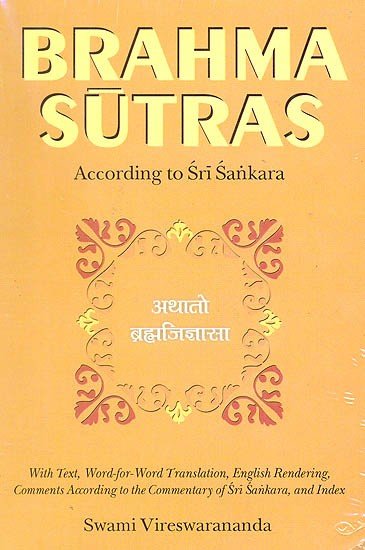Brahma Sutras (Shankara Bhashya)
by Swami Vireshwarananda | 1936 | 124,571 words | ISBN-10: 8175050063
This is the English translation of the Brahma-sutras including the commentary (Bhashya) of Shankara. The Brahma-sutra (or, Vedanta-sutra) is one of the three canonical texts of the Vedanta school of Hindu philosophy and represents an early exposition the Vedantic interpretation of the Upanishads. This edition has the original Sanskrit text, the r...
Chapter III, Section III, Adhikarana XIX
Adhikarana summary: Perfected Souls May Be Reborn For The Fulfilment Of Some Divine Mission
Brahma-Sutra 3.3.32: Sanskrit text and English translation.
यावदधिकारमवस्थितिराधिकारिकाणाम् ॥ ३२ ॥
yāvadadhikāramavasthitirādhikārikāṇām || 32 ||
yāvat-adhikāram—So long as the mission is not fulfilled; avasthitiḥ—(there is corporeal) existence; ādhikārikāṇām—of those who have a mission to fulfil.
32. Of those who have a mission to fulfil (there is corporeal) existence, so long as the mission is not fulfilled.
Rishi Apantaratama was born again as Vyasa. Sanatkumara was born as Skanda. So also other Rishis like Vasishtha and Narada were born again. Now these Rishis had attained the knowledge of Brahman, and yet they had to be reborn. If that is so, what is the utility of such knowledge of Brahman?—says the opponent. This Sutra refutes it and says that ordinarily a person after attaining Knowledge is not reborn. But the case of those who have a divine mission to fulfil is different. Those perfected sages have one or more births until their mission is fulfilled, after which they are not born again. But then they never come under the sway of ignorance although they may be reborn. Their case is analogous to that of a Jivanmukta, who even after attaining Knowledge continues his corporeal existence as long as the Prarabdha Karma lasts. The divine mission of these people is comparable to the Prarabdha Karma.
